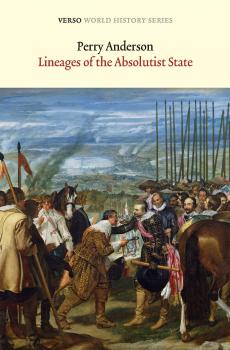ТОП просматриваемых книг сайта:
Историческая литература
Различные книги в жанре Историческая литература, доступные для чтения и скачиванияАннотация
Who – and what – are the Bourgeois? “The bourgeois … Not so long ago, this notion seemed indispensable to social analysis; these days, one might go years without hearing it mentioned. Capitalism is more powerful than ever, but its human embodiment seems to have vanished. ‘I am a member of the bourgeois class, feel myself to be such, and have been brought up on its opinions and ideals,’ wrote Max Weber, in 1895. Who could repeat these words today? Bourgeois ‘opinions and ideals’—what are they?” Thus begins Franco Moretti’s study of the bourgeois in modern European literature—a major new analysis of the once-dominant culture and its literary decline and fall. Moretti’s gallery of individual portraits is entwined with the analysis of specific keywords—“useful” and “earnest,” “efficiency,” “influence,” “comfort,” “roba”—and of the formal mutations of the medium of prose. From the “working master” of the opening chapter, through the seriousness of nineteenth-century novels, the conservative hegemony of Victorian Britain, the “national malformations” of the Southern and Eastern periphery, and the radical self-critique of Ibsen’s twelve-play cycle, the book charts the vicissitudes of bourgeois culture, exploring the causes for its historical weakness, and for its current irrelevance.
Аннотация
How the slave-based societies of Ancient Greece and Rome became the feudal societies of the Middle Ages. Passages from Antiquity to Feudalism is a sustained exercise in historical sociology that shows how the slave-based societies of Ancient Greece and Rome eventually became the feudal societies of the Middle Ages. In the course of this study, Anderson vindicates and refines the explanatory power of historical materialism, while casting a fascinating light on the Ancient world, the Germanic invasions, nomadic society, and the different routes taken to feudalism in Northern, Mediterranean, Eastern and Western Europe. Through this work and its companion volume, Lineages of the Absolutist State, Anderson presents a Marxist history of Western political development that takes readers from the first stirrings of political consciousness in the classical world to the rise of absolutist monarchies in Europe and the birth of the modern epoch.
Аннотация
Situating the Absolutist states of the early modern epoch against the background of European feudalism. Forty years after its original publication, Lineages of the Absolutist State remains an exemplary achievement in comparative history. Picking up from where its companion volume, Passages from Antiquity to Feudalism, left off, Lineages traces the development of Absolutist states in the early modern period from their roots in European feudalism, and assesses their various trajectories. Why didn’t Italy develop into an Absolutist state in the same, indigenous way as the other dominant Western countries, namely Spain, France and England? On the other hand, how did Eastern European countries develop into Absolutist states similar to those of the West, when their social conditions diverged so drastically? Reflecting on examples in Islamic and East Asian history, as well as the Ottoman Empire, Anderson concludes by elucidating the particular role of European development within universal history.
Аннотация
A provocative intellectual assault on the Subalternists' foundational work. Postcolonial theory has become enormously influential as a framework for understanding the Global South. It is also a school of thought popular because of its rejection of the supposedly universalizing categories of the Enlightenment. In this devastating critique, mounted on behalf of the radical Enlightenment tradition, Vivek Chibber offers the most comprehensive response yet to postcolonial theory. Focusing on the hugely popular Subaltern Studies project, Chibber shows that its foundational arguments are based on a series of analytical and historical misapprehensions. He demonstrates that it is possible to affirm a universalizing theory without succumbing to Eurocentrism or reductionism. Postcolonial Theory and the Specter of Capital promises to be a historical milestone in contemporary social theory.
Аннотация
Gripping analysis of Egypt’s transformation from military regime to police state, on the road to revolution. Revolutions are difficult to understand and almost impossible to predict. Egypt’s 2011 revolt was no exception. The military’s abandonment of Mubarak—a turning point for the revolt—confounded many observers, who assumed that the leader and the generals stood or fell together. The officers, it was thought, ruled from behind the scenes and simply swapped the figures in the spotlight to preserve the status quo. In a challenge to this conventional view, Hazem Kandil presents the revolution as the latest episode in an ongoing power struggle between the three components of Egypt’s authoritarian regime: the military, the security services, and the political apparatus. A detailed study of the interactions within this invidious triangle over six decades of war, conspiracy, and sociopolitical transformation, Soldiers, Spies, and Statesmen is the first systematic analysis of how Egypt metamorphosed from a military into a police state—and what that means for the future of its revolution.
Аннотация
Groundbreaking new work from the controversial author of Invention of the Jewish People. What is a homeland and when does it become a national territory? Why have so many people been willing to die for such places throughout the twentieth century? What is the essence of the Promised Land? Following the acclaimed and controversial The Invention of the Jewish People, Shlomo Sand examines the mysterious sacred land that has become the site of the longest-running national struggle of the twentieth and twenty-first centuries. The Invention of the Land of Israel deconstructs the age-old legends surrounding the Holy Land and the prejudices that continue to suffocate it. Sand’s account dissects the concept of “historical right” and tracks the creation of the modern concept of the “Land of Israel” by nineteenth-century Evangelical Protestants and Jewish Zionists. This invention, he argues, not only facilitated the colonization of the Middle East and the establishment of the State of Israel; it is also threatening the existence of the Jewish state today.
Аннотация
How the far right entered Britain’s mainstream through the front door. The past decade in the UK saw the rise of the British National Party, the country’s most successful ever far-right political movement, and the emergence of the anti-Islamic English Defence League. Taking aim at asylum seekers, Muslims, ‘enforced multiculturalism’ and benefit ‘scroungers’, these groups have been working overtime to shift the blame for the nation’s ills onto the shoulders of the vulnerable. What does this extremist resurgence say about the state of modern Britain? Drawing on archival research and extensive interviews with key figures, such as BNP leader Nick Griffin, Daniel Trilling shows how previously marginal characters from a tiny neo-Nazi subculture successfully exploited tensions exacerbated by the fear of immigration, the War on Terror and steepening economic inequality. Mainstream politicians have consistently underestimated the far right in Britain while pursuing policies that give it the space to grow. Bloody Nasty People calls time on this complacency in an account that provides us with fresh insights into the dynamics of political extremism.
Аннотация
This new edition of Mike Davis’s visionary work gives an update on Los Angeles as the city hits the 21st century. No metropolis has been more loved or more hated. To its official boosters, «Los Angeles brings it all together.» To detractors, LA is a sunlit mortuary where «you can rot without feeling it.» To Mike Davis, the author of this fiercely elegant and wide- ranging work of social history, Los Angeles is both utopia and dystopia, a place where the last Joshua trees are being plowed under to make room for model communities in the desert, where the rich have hired their own police to fend off street gangs, as well as armed Beirut militias. In City of Quartz , Davis reconstructs LA's shadow history and dissects its ethereal economy. He tells us who has the power and how they hold on to it. He gives us a city of Dickensian extremes, Pynchonesque conspiracies, and a desperation straight out of Nathaniel Westa city in which we may glimpse our own future mirrored with terrifying clarity. In this new edition, Davis provides a dazzling update on the city's current status.
Аннотация
In this monumental book, Chris Harman achieves the impossible—a gripping history of the planet from the perspective of the struggling people throughout the ages. From earliest human society to the Holy Roman Empire, from the Middle Ages to the Enlightenment, from the Industrial Revolution to the end of the millennium, Chris Harman provides a brilliant and comprehensive history of the planet. Eschewing the standard histories of ‘Great Men,’ of dates and kings, Harman offers a groundbreaking counter-history, a breathtaking sweep across the centuries in the tradition of ‘history from below.’ In a fiery narrative, he shows how ordinary men and women were involved in creating and changing society and how conflict between classes was often at the core of these changes. While many pundits see the victory of capitalism as now safely secured, Harman explains the rise and fall of societies and civilizations throughout the ages and demonstrates that history never ends. This magisterial study is essential reading for anyone interested in how society has changed and developed and the possibilities for further radical change.
Аннотация
Bestselling new analysis of Jewish history by a leading Israeli historian. A historical tour de force, The Invention of the Jewish People offers a groundbreaking account of Jewish and Israeli history. Exploding the myth that there was a forced Jewish exile in the first century at the hands of the Romans, Israeli historian Shlomo Sand argues that most modern Jews descend from converts, whose native lands were scattered across the Middle East and Eastern Europe. In this iconoclastic work, which spent nineteen weeks on the Israeli bestseller list and won the coveted Aujourd'hui Award in France, Sand provides the intellectual foundations for a new vision of Israel’s future.










